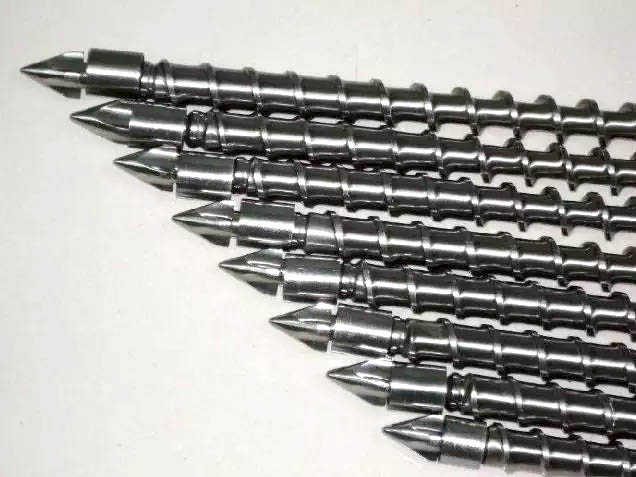As we know, “screw plasticizing component” of the injection molding machine is the main core unit of the injection molding machine, which directly reflects the performance of the injection molding machine. Screw is “heart”, and its performance determines the quality and efficiency of the processed product. With the rapid development of the plastics industry, injection molding equipment has matured. As the designer and user of injection molding equipment, it is necessary to understand which screws are suitable for the processing of materials. Users often use a screw to process plastics with unsuitable physical properties. There is also a misunderstanding: “I think a screw is omnipotent”, but it is not. By this, a brief introduction of several commonly used screws can be used to provide some references when processing products.
(1) PC material (polycarbonate) features:
1. Non-crystalline plastic, no obvious melting point, glass transition temperature 140 ° C -160 ° C, melting temperature 215 ° C -225 ° C, molding temperature 230°C -320°C;
2. High viscosity, high processing temperature, narrow range, easy to decompose, avoiding overheating when using screw;
3. Sensitive to moisture, the resin is easily hydrolyzed at high temperature, the drying temperature is 120 ° C -130 ° C, and the time is about 4 hours.
Parameter selection:
1. L/D is designed to select a large aspect ratio for improving the plasticizing effect for its good thermal stability and high viscosity;
2. Due to its wide melting temperature range, the feeding section is long, the homogenization section is short, and the compression ratio is moderate. The barrier type over-adhesive head can be selected for increasing the plasticizing effect;
3. For example, if you add flame retardant or glass fiber reinforced PC material, you can choose to use corrosion-resistant and wear-resistant high-quality stainless steel tool steel screw and three small pieces.
(2) PMMA (Plexiglas) Features:
1. The glass transition temperature is 105 ° C, the melting temperature is greater than 160 ° C, the decomposition temperature is 270 ° C, and the molding temperature range is 180-250 ° C;
2. High viscosity, poor fluidity, sensitive to shear rate, strict temperature control during processing;
3. The cylinder temperature is 240 ° C -250 ° C, and the residence time exceeds 8 minutes when the temperature exceeds 260 ° C;
4. Strong water absorption, drying temperature 80 ° C -90 ° C, time more than 3 hours.
Parameter selection:
1. L/D selects the aspect ratio 20-22, and the gradient type screw generally takes L1=35-45%, L2=35-40%;
2. The compression ratio ε generally takes 2.3-2.6;
3. For its hydrophilicity, a mixing head structure is used at the front end of the screw.
(3) PA (polyamide), common PA6 (nylon 6), PA66 (nylon 66) characteristics:
1. There are many kinds of crystalline plastics, different types, different melting points, narrow upper melting point, generally PA66 melting point of 260 ° C -270 ° C;
2. Low viscosity, good fluidity, relatively obvious melting point, poor thermal stability;
3. The water absorption rate is high, the dryer temperature is 80 ° C, does not exceed 120 ° C, and the time is 16 hours. If the material is exposed to air for 8 hours, use a vacuum oven at around 105 ° C for 12 hours.
Parameter selection:
1. L/D selects a mutant screw having a length ratio of 18-20;
2. The compression ratio is generally selected from 2.5 to 3.5, which prevents overheating decomposition h3: 0.067-0.089D;
3. Because of its low viscosity, the gap between the rubber ring and the barrel should be as small as 0.05-0.08, and the gap between the screw and the barrel is 0.08-0.12.
4. The nozzle can be equipped with a spring self-locking type nozzle.
(4) PET (Polyester) Chemical Name: Polyethylene terephthalate Characteristics:
1. Melting point of 250 ° C -260 ° C, blow molding PET molding temperature is wide, about 255 ° C -290 ° C, enhanced grade GF-PET up to 290 ° C -315 ° C;
2. High melting point, low viscosity, high adhesion to metal, easy to hydrolyze;
3. Hydrophilic, the binder is sensitive to water at high temperature, the drying temperature is 150 ° C -160 ° C, and the time is more than 4 hours.
Preferences:
1.L/D generally takes 20-22, three-segment distribution L1=50-60%, L2=20-30%;
2. Using low shear, low compression ratio screw compression ratio ε = 1.8-2.2, because shear overheating leads to discoloration or opacity h3=0.09-0.10D;
3. When using recycled material (sheet material), increase the conveying capacity of the feeding section and adopt the forced feeding plasticizing system.
(5) PVC (polyvinyl chloride)
Thermally sensitive materials are generally classified into hard and soft, the difference being the amount of plasticizer added to the raw material, less than 10% being hard, and more than 30% being soft.
Features:
1. No obvious melting point, softening at 60 °C, viscoelastic state at 100 °C-150 °C, narrow melting temperature range at 140 °C, poor thermal stability, easy decomposition, rapid decomposition at 170 °C, softening point close to decomposition point, decomposition release For HC1 gas.
2. Due to the high viscosity of UPVC melt, poor thermal stability, temperature and time will lead to decomposition, so it has a corrosive effect on general steel;
3. The temperature control is strict, the screw design should be as low as possible to prevent overheating, the flow channel must be smooth, there must be no dead angle, and the accumulation of material can be prevented from decomposing;
4. The screw barrel should be protected from corrosion;
5. The injection molding process needs to be strictly controlled.
Preferences:
1.L/D=18-21, h3=0.067-0.08D, ε=1.6-2, L1=40-45%, L2=35-45%, in order to prevent the hiding of the material without apron, head 20 ° C -30 ° C, using a hard chrome plated screw;
2. The choice of temperature control;
1 melted cylinder multi-stage air cooling device;
2 Low shear high mixing UPVC special screw barrel device.




